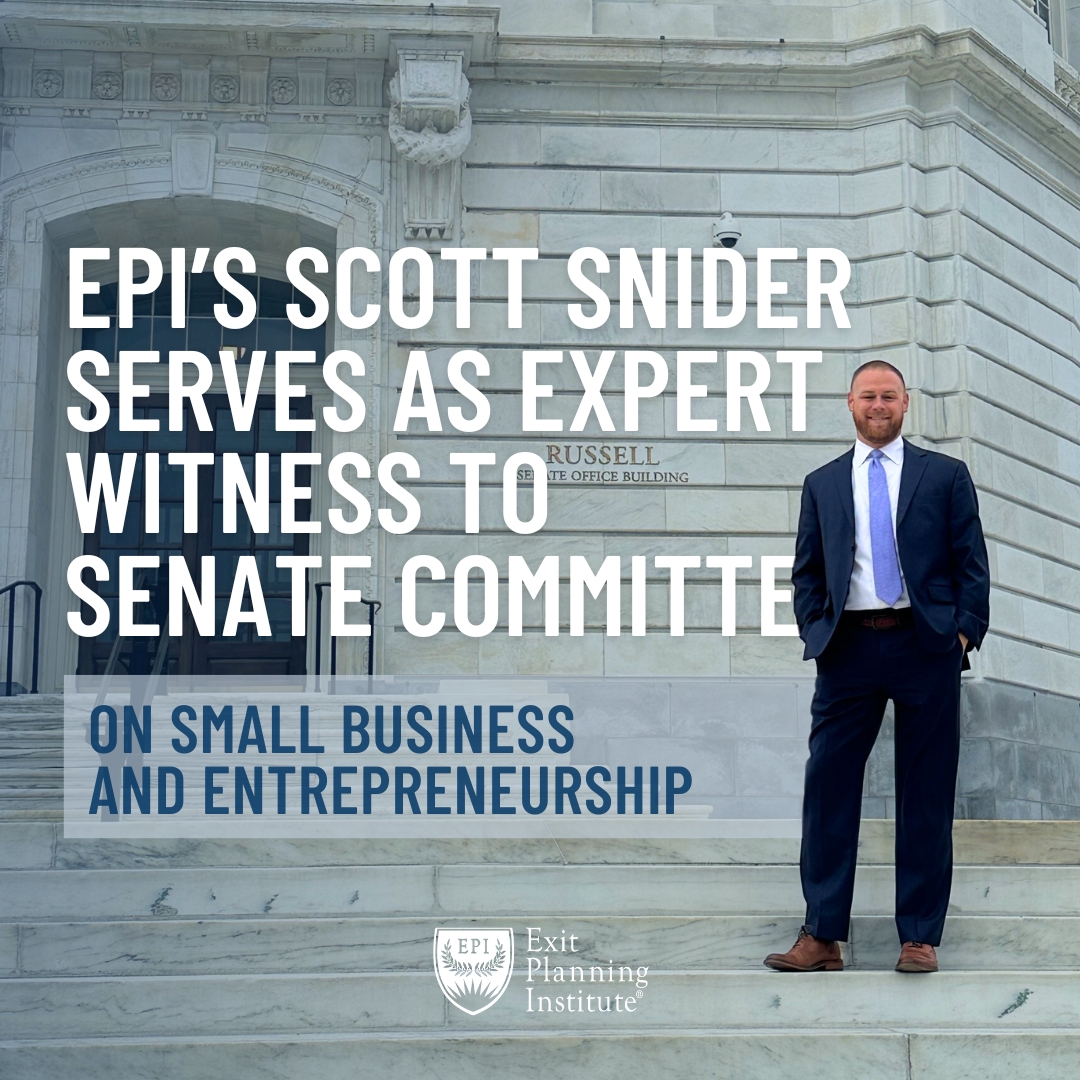
THE EXIT PLANNING BLOG
Keep up-to-date with exit planning, succession planning, industry trends, unique specialty insights, and useful content for professional advisors and business owners.
Share this
EPI’s Scott Snider Serves as Expert Witness to Senate Committee on Small Business and Entrepreneurship
by Colleen Kowalski on February 1, 2024

Scott Snider, President of Exit Planning Institute, was invited by Senator Jeanne Shaheen to speak on January 24, 2024, as an expert witness before the U.S. Senate Committee on Small Business and Entrepreneurship. The committee held a special session called Succession Planning: Opportunities to Build Wealth and Keep Jobs in Local Communities.
.jpeg?width=500&height=500&name=Image%20(6).jpeg)
“More than just providing my expertise, today was an excellent opportunity for all of us involved to learn more about the needs of business owners and about critical statistics that surround the business owner looking to harvest value and transition their company,” said Snider.
The Trapped Wealth of Small Business Owners
During his five-minute testimony, Scott Snider discussed how small businesses are the backbone of the U.S. economy, reminding the committee that over 30 million small businesses in the U.S. employ nearly 62% of Americans.
The challenge, Snider said, is that nearly 90% of these business owners’ wealth is trapped inside their largest asset: their company. Snider reported that this wealth is projected to total nearly $18 trillion—with $14 trillion alone coming to market in the next 10 years as 73% of owners report they want to exit from their companies within that timeframe. Snider’s data comes from EPI’s recent National State of Owner Readiness™ Survey, the first national study since 2013 to measure owner readiness in transitioning private businesses to new ownership.
Scott Snider shares, “It was an honor to deliver the testimony, be asked the most questions by our US Senators, and even have Chairwoman Senator Shaheen utilize some familiar exit planning phrases and ask directly for EPIs National State of Owner Readiness Survey results that are due out on March 1.”
Results from the survey will be unveiled at the State of Institute Address on February 29.
Building Significant Companies
Snider testified to the Senate Committee that for succession planning to be successful, business owners need to build significant companies—ones that are highly valuable and transferrable at any time, while also being aligned to the owner’s business, personal, and financial goals.
Because he is in the unique position of both teaching about significant companies while also living it daily as a business owner, Snider asked the Senate Committee to consider three key ways to better support business owners who will ultimately transition their companies:
Education that brings exit strategy into the present, incorporating it early and often.
Snider expands on this, saying, “Undoubtedly exit planning is a critical path to all business owners in the US. The theme of the hearing was education as the Senators asked how their committee and the government could better support business owners locally. How do we help change the owner’s mindset and lead the owner from the start down a pathway of significance not just success? Senator Cardin asked me questions during the hearing noting that start-up entrepreneurs are too busy to consider their exit as they are focused on revenue generation and getting their business off the ground so they could turn their first profit. I believe it is our job as professional advisors to come alongside the owner and help them understand that exit strategy is business strategy. I also believe, as someone who has started one business from scratch and bought a business in its infancy, that owners have a choice. No one is too busy to educate themselves. But owners don’t know what they don’t know.”
Greater access to coaching and services—is critically important since 78% of owners have not formed a transition advisory team that embraces the three elements of significance: business, personal, and financial.
In the 2023 National State of Owner Readiness Report, we studied business owners from three perspectives. These three elements compose the organizing principle of the Value Acceleration Methodology. A framework for an exit strategy and significant companies that have been adopted and integrated over the last ten years by thousands of small to lower middle market companies and has become the standard of the exit planning profession. These three areas, business, personal, and financial, include key elements in defining the readiness and preparedness of the company and the owner.
Data and research, so policymakers can better understand how succession planning gaps impact small business sales, transitions, and closures.
Snider says, “According to the soon-to-be-released National State of Owner Readiness Survey, the transfer of wealth has risen from $10 Trillion to $18 Trillion with $14 Trillion coming due within the next 10 years as 73% of owners indicate they want to transition in that timeframe. Business owners’ exits have quickened. With the baby boomers at traditional retirement age, they have been influenced recently by the market, uncertain economic outlook, age, and health. Additionally, more so than ever, Generation X, people ages 42 to 57, are speeding up the exits in the US with their built-to-sell mentality and urge to balance their lives.”
Education Foundational to Succession Planning
As the senators asked the witness panel questions, the discussion continued to return to the importance of education for business owners as well as those who advise them throughout their careers. Snider says this education is foundational to changing owners’ mindsets about succession planning.
“Many small business owners are so focused on the daily grind of running and growing their business that owners don’t have a value-creator mindset,” Snider said. “Education about succession planning and how to successfully exit your company is central to creating this mindset.”
In rural communities with fewer resources, Snider encourages partnerships to ensure that education is available. These could be partnerships with economic development centers, family enterprise centers, small business development centers, and even college alumni associations.
“A great organization is grown through partnerships, so we need to look for ways to increase awareness and bring education to owners and those who counsel them,” he said.
More about the Senate Witness Panel
If you missed the live Senate panel, the archived webcast is available online. You can also download and read Snider’s testimony here.
Joining Snider on the Witness Panel was:
- Theresa Hildreth, Executive Director, Calhoun County Economic Development Corporation, Rockwell City, IA
- Tabitha Croscut, Shareholder/Attorney, Devine-Millimet & Branch, Manchester, NH
- Palmer Schoening, Chairman, Family Business Coalition, Washington, D.C.
Share this
- Blog (548)
- CEPA (431)
- exit planning (249)
- CEPA community (188)
- Business Owner (175)
- Exit Planning Summit (99)
- EPI Chapter Network (89)
- Value Acceleration Methodology (81)
- Exit Planning Partner Network (76)
- EPI Announcement (50)
- Content (48)
- Webinars (37)
- Excellence in Exit Planning Awards (34)
- Marketing (30)
- 2024 Exit Planning Summit (28)
- 5 Stages of Value Maturity (26)
- Books (24)
- EPI Academy (24)
- EPI Team (22)
- Exit Planning Teams (22)
- Leadership (21)
- 2023 Exit Planning Summit (20)
- family business (20)
- women in business (19)
- Intangible Capital (18)
- Exit Options (17)
- Black Friday (16)
- CPA (15)
- Walking to Destiny (15)
- Chapters (14)
- State of Owner Readiness (14)
- charitable intent (13)
- Chris Snider (12)
- National Accounts (12)
- Small business (12)
- personal planning (12)
- Financial Advisors (11)
- Season of Deals (9)
- 5 Ds (8)
- About us (8)
- Podcast (8)
- Scott Snider (8)
- Insiders Bash (7)
- Christmas (6)
- Exit Planning Content Library (6)
- Case Studies (5)
- Owner Roundtables (5)
- Three Legs of the Stool (5)
- Value Advisors (5)
- financial planning (5)
- Awards (4)
- Circle of Excellence (4)
- EPI Thought Leadership Council (4)
- Exit & Succession (4)
- Five Ds (4)
- executive training (4)
- DriveValue (3)
- Owners Forum (3)
- author (3)
- forbes (3)
- Exit Is Now Podcast (2)
- Peter Christman (2)
- Veteran (2)
- Whitepapers (2)
- Annual Exit (1)
- Business Owners Forum (1)
- SOOR (1)
- business consultants (1)






.png)
